Serving 894 students in grades Kindergarten-5, Highland Elementary School ranks in the bottom 50% of all schools in North Carolina for overall test scores (math proficiency is bottom 50%, and reading proficiency is bottom 50%).
The percentage of students achieving proficiency in math is 36% (which is lower than the North Carolina state average of 51%). The percentage of students achieving proficiency in reading/language arts is 43% (which is lower than the North Carolina state average of 50%).
The student:teacher ratio of 14:1 is lower than the North Carolina state level of 15:1.
Minority enrollment is 54% of the student body (majority Hispanic), which is lower than the North Carolina state average of 57% (majority Black and Hispanic).
Quick Stats (2025)
- Grades: Kindergarten-5
- Enrollment: 894 students
- Student:Teacher Ratio: 14:1
- Minority Enrollment: 54%
- Overall Testing Rank: Bottom 50% in NC
- Math Proficiency: 36% (Btm 50%)
- Reading Proficiency: 43% (Btm 50%)
- Science Proficiency: 45-49% (Btm 50%)
- Source: National Center for Education Statistics (NCES), NC Dept. of Education
School Overview
Highland Elementary School's student population of 894 students has declined by 13% over five school years.
The teacher population of 63 teachers has stayed relatively flat over five school years.
Grades Offered
Grades Kindergarten-5
Total Students
894 students
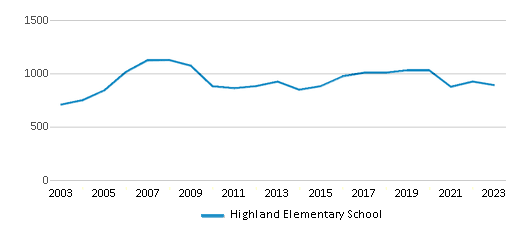
Gender %
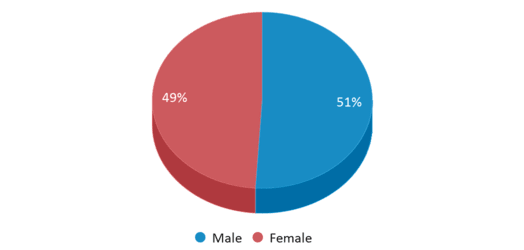
Total Classroom Teachers
63 teachers
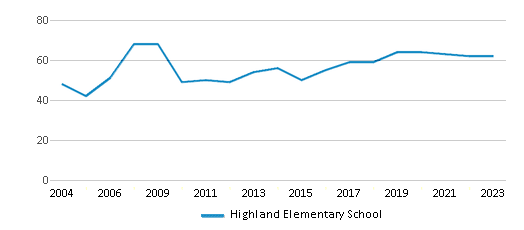
Students by Grade
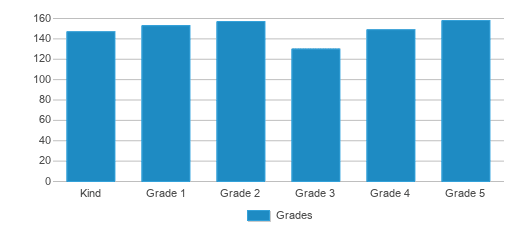
School Rankings
Highland Elementary School ranks within the bottom 50% of all 2,617 schools in North Carolina (based off of combined math and reading proficiency testing data).
The diversity score of Highland Elementary School is 0.69, which is less than the diversity score at state average of 0.71. The school's diversity has stayed relatively flat over five school years.
Overall Testing Rank
#1778 out of 2617 schools
(Bottom 50%)
(Bottom 50%)
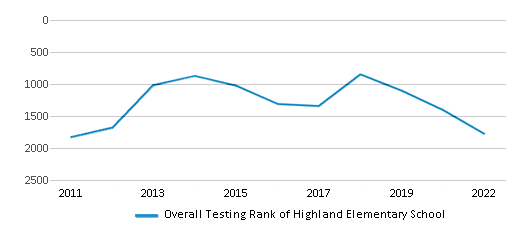
Math Test Scores (% Proficient)
36%
51%
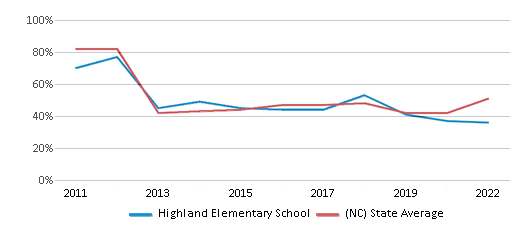
Reading/Language Arts Test Scores (% Proficient)
43%
50%
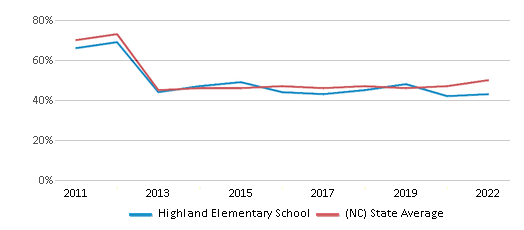
Science Test Scores (% Proficient)
45-49%
63%
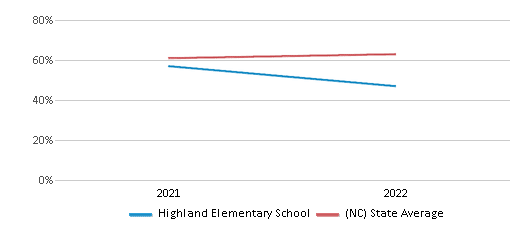
Student : Teacher Ratio
14:1
15:1
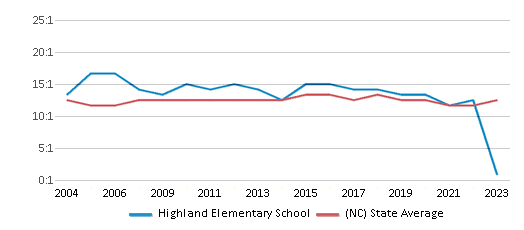
American Indian
n/a
1%
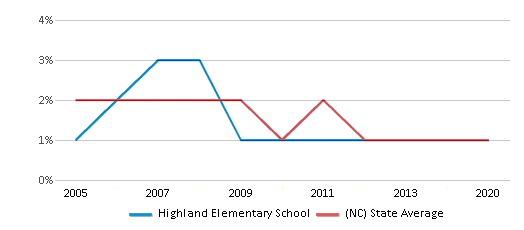
Asian
1%
4%
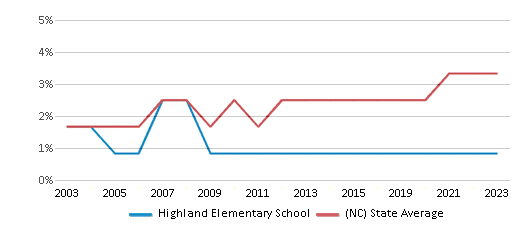
Hispanic
26%
21%
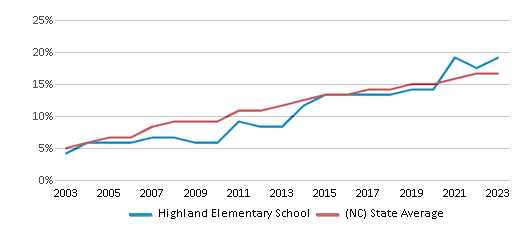
Black
18%
25%
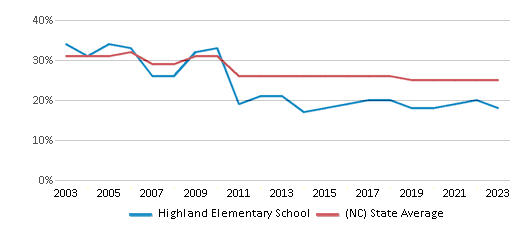
White
46%
43%
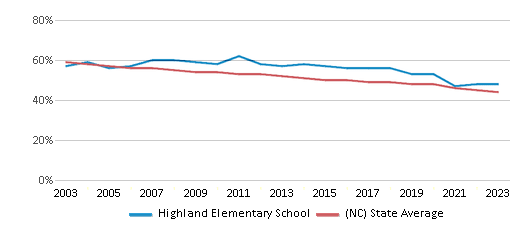
Hawaiian
1%
n/a
Two or more races
8%
6%
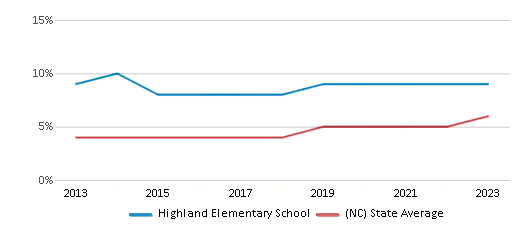
All Ethnic Groups
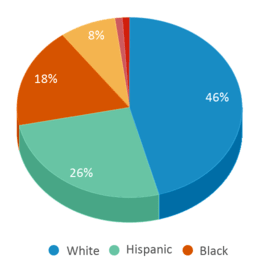
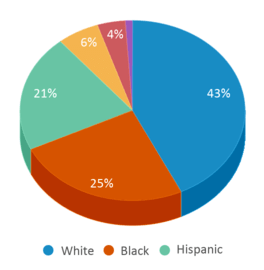
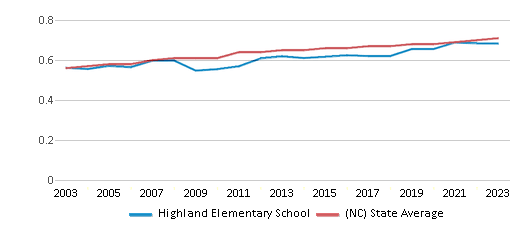
Participates in the National School Lunch Program (NSLP)
Yes
Eligible for Free Lunch
51%
68%
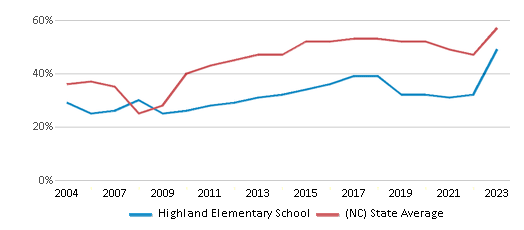
Eligible for Reduced Lunch
4%
1%
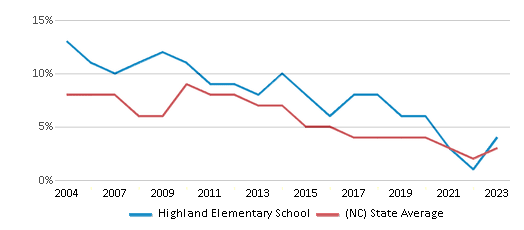
School Statewide Testing
School District Name
Source: National Center for Education Statistics (NCES), NC Dept. of Education
Profile last updated: 02/09/2025
Frequently Asked Questions
What is Highland Elementary School's ranking?
Highland Elementary School is ranked #1778 out of 2,617 schools, which ranks it among the bottom 50% of public schools in North Carolina.
What percent of students have achieved state testing proficiency in math and reading?
36% of students have achieved math proficiency (compared to the 51% NC state average), while 43% of students have achieved reading proficiency (compared to the 50% NC state average).
How many students attend Highland Elementary School?
894 students attend Highland Elementary School.
What is the racial composition of the student body?
46% of Highland Elementary School students are White, 26% of students are Hispanic, 18% of students are Black, 8% of students are Two or more races, 1% of students are Asian, and 1% of students are Hawaiian.
What is the student:teacher ratio of Highland Elementary School?
Highland Elementary School has a student ration of 14:1, which is lower than the North Carolina state average of 15:1.
What grades does Highland Elementary School offer ?
Highland Elementary School offers enrollment in grades Kindergarten-5
What school district is Highland Elementary School part of?
Highland Elementary School is part of Harnett County Schools School District.
School Reviews
5 7/19/2016
i was told that sports/karate was offered after school at the school before we moved to nc
was told later after child was in school no such activities at the school/ was disappointed with
school information
2 9/26/2007
I have had children at Highland Elementary since it first opened and have not been happy with the progress...it seems to be going down hill every year. The staff is rude....the teachers do not care about the children like they claim. Their solution to a child not learning is blaming it on the child not willing to learn and reataining them year after year. The class size is too big of almost 30 students to pay adequate attention to any child falling behind. They do not offer any kind of Tutoring for younger children below 3rd grade....and do not teach at grade level. They have failed to make the No School Left Behind Grade for two years in a row and you can bet that now I have to chance to move my children to a different school.... I am moving them ASAP and giving another school the chance to teach my children what Highland Elementary could not.
Review Highland Elementary School. Reviews should be a few sentences in length. Please include any comments on:
- Quality of academic programs, teachers, and facilities
- Availability of music, art, sports and other extracurricular activities
Recent Articles

What Is A Charter School?
Explore the world of charter schools in this comprehensive guide. Learn about their history, how they operate, and the pros and cons of this educational innovation. Discover key facts about charter schools, including admission policies, demographics, and funding, as well as what to look for when considering a charter school for your child.

10 Reasons Why High School Sports Benefit Students
Discover the 10 compelling reasons why high school sports are beneficial for students. This comprehensive article explores how athletics enhance academic performance, foster personal growth, and develop crucial life skills. From improved fitness and time management to leadership development and community representation, learn why participating in high school sports can be a game-changer for students' overall success and well-being.

February 05, 2025
Understanding the U.S. Department of Education: Structure, Impact, and EvolutionWe explore how the Department of Education shapes American education, from its cabinet-level leadership to its impact on millions of students, written for general audiences seeking clarity on this vital institution.





